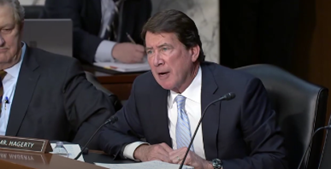Bank CEOs Confirm to Hagerty That Basel Endgame Proposed Regulations Would Hurt American Economy, Small Businesses, and Home Borrowers

Proposal would raise capital requirements, which would reduce lending to small businesses and consumers, as well as put American banks at a competitive disadvantage internationally
WASHINGTON—United States Senator Bill Hagerty (R-TN), a member of the Senate Banking Committee, today in a hearing elicited confirmation from top U.S. bank CEOs that, despite claims to the contrary by federal regulators, the Federal Reserve’s Basel Endgame Proposal would have a significant negative impact on the American banking sector by both harming banks’ ability to lend to small businesses and consumers and placing them at a competitive disadvantage internationally.
“Vice Chair Michael Barr—who’s leading the effort on the Basel III Endgame—he says that the impacts of the new requirements they’re proposing are going to be minimal,” Hagerty said.
“Would anybody here that believes that the impact of Basel III would be minimal raise your hand please?” Hagerty asked.
Not a single bank CEO raised their hand, making clear that all major bank leaders in front of the committee—Charles Scharf, Brian Moynihan, Jamie Dimon, Jane Fraser, Ronald O’Hanley, Robin Vince, David Solomon, and James Gorman—believe that Basel III Endgame would have major, harmful impacts on American banks.
Dimon, Chairman and CEO of JPMorgan Chase & Co., stated that the proposal would “take a lot of loans and immediately make them unprofitable” and “will particularly diminish mortgages for lower-income people because the cost of all of this is actually much higher on a $150,000 mortgage than on a . . . $2 million mortgage.”
Fraser, CEO of Citigroup, told Hagerty that the proposal “diminishes the U.S. banks’ competitiveness on an international basis.”
“The regulators that are focusing on Basel III seem to be hiding behind the claim that this is merely harmonization of capital requirements. And when you think about a harmonization of capital requirements, it would lead you to believe that U.S. banking capital is somehow below that of our European competitors. And if that were the case, this might allow regulators to prevent ‘a race to the bottom.’ But this is not the case… Chairman Powell says, ‘The proposal exceeds what is required by the Basel agreement, and it exceeds what’s been required in what’s been done by implementation by the jurisdictions,’” Hagerty said.

###





